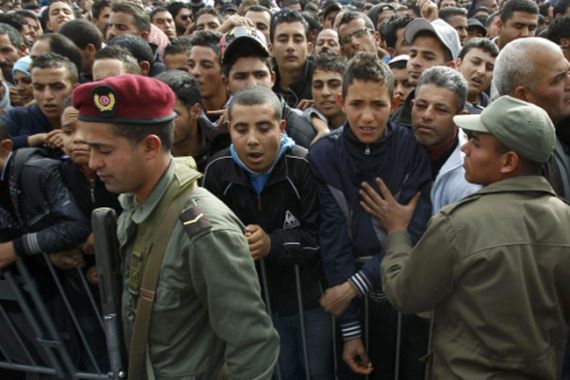Tunisian town marks anniversary of revolution
Thousands pack Sidi Bouzid where a giant statue of Mohamed Bouazizi, credited for sparking the uprising, was unveiled.

| Al Jazeera visits the town of Sidi Bouzid one year later |
Tens of thousands of people packed the provincial town square of Sidi Bouzid to celebrate the first anniversary of Tunisia’s revolution in the place where it began, unleashing a tide of popular revolt that has transformed the Arab world.
The ceremony on Saturday was attended by the Moncef Marzouki, Tunisia’s president, where a giant statue of Mohamed Bouazizi, credited for sparking Tunisia’s revolution, was unveiled.
The festive mood in Sidi Bouzid was tempered somewhat by reminders that democratic change in Tunisia has yet to ease poverty and high unemployment, bread and butter issues that preoccupy many Tunisians and have triggered rioting.
The fuse for “Arab Spring” uprisings was lit when Bouazizi, an unemployed university graduate, set himself on fire in despair at police who had confiscated his unlicensed fruit and vegetable cart. He died later in hospital.
Bouazizi’s death took the lid off simmering anger about poverty, joblessness, corruption and repression. Protests erupted across Tunisia, forcing President Zine Al-Abidine Ben Ali to flee the country less than a month later.
Tunisia’s revolution inspired other Arabs to rise up against entrenched authoritarian rulers.
They were overthrown in Egypt and Libya. Yemen’s leader has stepped aside for a reformist transition while Syria’s president faces a spreading insurgency.
Celebrations
|
“My son set himself alight to grant liberty to Tunisia and the Arab world … I ask government officials to pay attention to poor areas and provide jobs for young people.” -Manoubia Bouazizi |
In Sidi Bouzid, tens of thousands of people rallied joyfully in the central square, dancing to the rhythms of popular songs despite cold weather, and flags and photographs of Tunisians killed in the uprising decorated the streets.
“It’s a day of joy; Sidi Bouzid has long suffered from neglect and today it has become the capital of the world,” said a dancing young man who identified himself as Emad.
“On December 17 last year, the Arab world began a new page of history, this is really a source of pride,” he said.
Celebrations will run through the weekend with some leading international figures on hand, including the Nobel Peace Prize-winning Yemeni opposition activist Tawakkol Karman.
But Manoubia Bouazizi, Mohammed’s mother, conveyed the underlying concerns of many by urging Tunisian authorities to parlay the revolution into a better quality of life for the population, especially the young.
“[My son] set himself alight to grant liberty to Tunisia and the Arab world … I ask government officials to pay attention to poor areas and provide jobs for young people,” she said.
Restoring dignity
Moncef Marzouki, made president this week as part of a governing coalition installed after Tunisia’s first democratic vote, paid tribute to Tunisians who defied Ben Ali and in some cases paid with their lives to see through the revolution.
“Sidi Bouzid, which has suffered from marginalisation, restored the dignity of all Tunisians,” he said. “We have pledged to restore the joy of life to these areas.”
Tunisia’s revolution has brought democratic freedoms for the first time since independence from France in 1956.
But it has not so far tackled poverty and rampant joblessness.
In fact, the revolution has set back the economy by frightening off some tourists and foreign investors.
Popular resentment over economic woes has boiled over into rioting in several towns in recent weeks. Protesters set fire to some public buildings and clashed with security forces.
“Honoring Sidi Bouzid is good but we need to work, only jobs can restore our dignity. People here need bread, not a musical instrument to entertain themselves,” Nabila Abidi, an unemployed university graduate, told the Reuters news agency in the town.
“The new government must understand the message well and take care of us and improve our conditions. If not, the revolution will return,” said Mansour Amamou, another resident.
Tunisia’s gross domestic product growth is forecast to drop to about 0.2 per cent in 2011 from 3 percent in the last year of Ben Ali’s rule. However, officials expect it to bounce back to 4.5 per cent in 2012.
Unemployment, at 13 per cent at the end of 2010, is now at 18.3 per cent, according to central bank figures.
The jobless rate among young people is much higher.
Voters in October handed victory to the Islamist Ennahda party.
A cabinet line-up is expected to be announced in coming days. The new leaders will hold power for a year while a new constitution is drawn up and fresh elections are prepared.